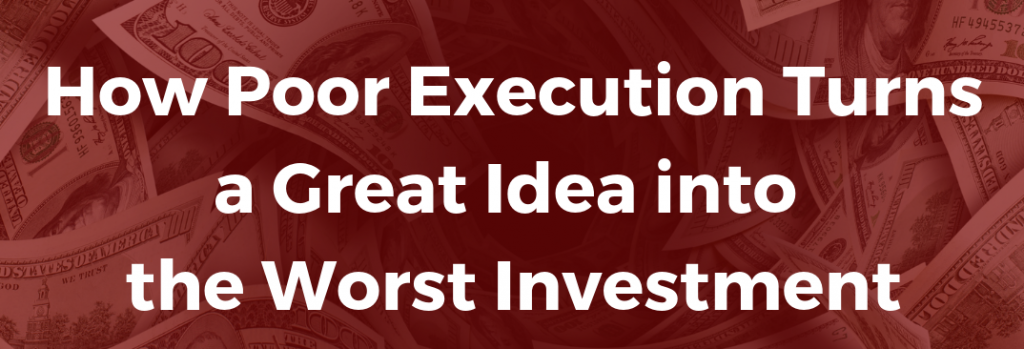How Poor Execution Turns a Great Idea into the Worst Investment
This post was originally published here.
In early 2017, I was shown an opportunity to invest in a US$6.5m simple agreement for a future equity (SAFE) note issued by BuildDirect.com Technologies Inc., a $1bn Canadian e–commerce company.
All of business’ facets looked solid
My client had made previous investments in the company and had a strong conviction in the team, the company, the market and this “new marketplace” opportunity. The company sells heavy construction supplies, such as tiles and granite, to contractors and home-improvement enthusiasts.
Confidence builds when following ‘the smart money’
BuildDirect claimed to have developed an intelligent system to pre–position products in hubs around the country to cut the costs and time of delivery. We were also confident because we were supposedly following “the smart money” – a major Canadian pension fund and other Silicon Valley venture capital firms were also investing.
Many factors point to a ‘sound’ investment
We were excited about the model; its artificial intelligence (AI) platform and the business opportunity and history of the company, which was 16 years old and had been grossing more than C$150m (US$120m) a year in revenues. We also had clients that used the company’s services. We made the investment, which was around US$650,000. Within a few months we were notified that, as expected, our debt had been converted to equity.
Ten months later, we learned that the CEO had been fired/asked to resign. He was the architect of the whole “marketplace” idea. Weeks later, we learned that the company had entered into receivership. It appears now to be a total loss.
Even good ideas can lead to a premature fall
Established companies can fail swiftly and dramatically. This company developed a very clever online marketplace, however they were utterly unable to execute it and ended up angering and losing their existing and long-standing vendors.
Andrew’s takeaways – Avoid these mistakes to become a better investor
Don’t blindly follow the smart money
Just because big fund managers are buying into a company does not mean that those fund managers are right. They could just as much be wrong. Don’t take any comfort that you are investing with the “smart money”, meaning the professional investors. They are often under career pressures and other pressures that can lead them to bad decisions. If you want to invest, take the time to build your style and plan, and then follow it. An individual has considerable advantages compared to the pros.
Have an exit plan
No matter how good the investment is, no matter how experienced the others who you are investing in are, and no matter how much research you have done, always have an exit plan. Investing involves too much uncertainty; having an exit plan allows you to pre-plan what you will do when things go wrong.
Mistakes in this story
1. Failed to do their own research
2. Failed to properly assess and manage risk
- Assumed past performance would continue
- Bought an illiquid investment
- Lacked influence over management
3. Driven by emotion or flawed thinking
- Let emotions drive their investment decisions
- Were driven by FOMO
5. Failed to monitor their investment
- Failed to review investment strategy regularly
6. Invested in a start-up company
- Invested in a start–up that lacked various sources of funds
Learn about the six ways you will lose your money and how to avoid them here.
DISCLAIMER: This content is for information purposes only. It is not intended to be investment advice. Readers should not consider statements made by the author(s) as formal recommendations and should consult their financial advisor before making any investment decisions. While the information provided is believed to be accurate, it may include errors or inaccuracies. The author(s) cannot be held liable for any actions taken as a result of reading this article.


